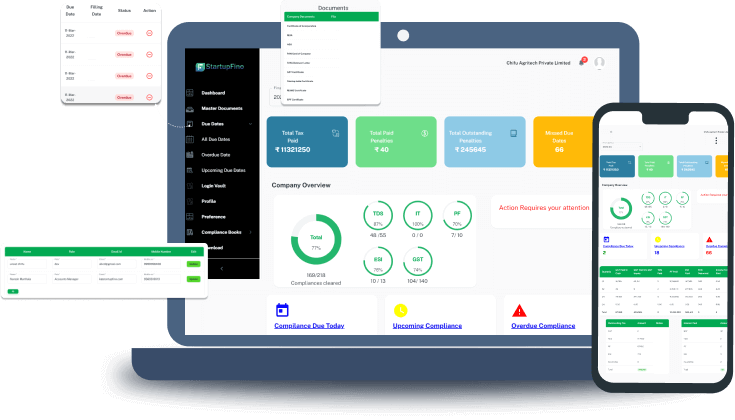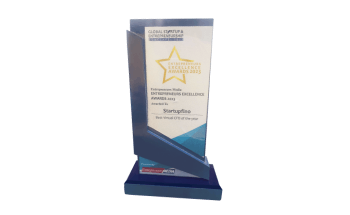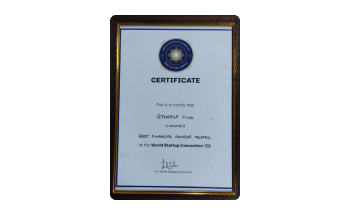A partnership firm is a kind of business structure in India, wherein there are a minimum of two persons. Partners share profits based on agreed ratios in businesses like ex.- trade, occupation, and profession. Partnership registration is governed by the Indian Partnership Act, 1932, by which the partners enter into a contract known as a partnership deed to regulate their relationships and with the firm.
Importance of Partnership Registration Online
The most significant advantage of partnership registration is the separate legal entity status granted under law. The registered partnership firm can open a bank account, obtain trade licences, initiate legal proceedings, enter into contracts and undertake various business dealings in its own name. The partners' personal assets are protected from business liabilities. This promotes more organised accounting and documentation.
With this, registration of partnership is helpful in preventing the unauthorised and fraudulent use of the firm name and goodwill by other people or the outsiders. It safeguards the brand identity built by the partnership. The registration certificate also facilitates carrying out daily business smoothly by serving as identity proof with customers, investors, banks etc.
Further, in case of any disputes between partners, registration helps prove the terms of the partnership through legal evidence. It outlines procedures for dispute resolution and adds authenticity while obtaining loans or approaching courts as an enterprise.
From taxation and compliance angles too, registered firms are better organised to meet reporting requirements, file taxes and avail legal exceptions. Overall, the process lends more transparency to the partnership in all external dealings. Partners can even avail funding from banks using firm assets. Hence, registration upgrades an informal collaboration to a formal, legally tenable partnership model with regulatory advantages. Obtaining these benefits through registration justifies overcoming the small procedural efforts and fees involved.
Who Can Be a Partner in Partnership Firms
Following can be partners in Indian partnership firms:
|
Criteria
|
Eligibility
|
|
Mental and Legal Fitness
|
Must be mentally sound, of legal age, solvent, and legally capable of entering contracts.
|
|
Registered Partnership Firms
|
Can partner with other registered firms or businesses.
|
|
Head of a Hindu Family
|
Leader of a Hindu Undivided Family contributing skills and labour can be a partner.
|
|
Companies as Partners
|
Companies, as legal entities, can be partners if their objectives align.
|
|
Trustees of Specific Trusts
|
Trustees of private religious, family, or Hindu trusts can partner unless prohibited by rules.
|
Characteristics of Partnership Firms
Following are the features of partnership firms in India:
|
Aspect
|
Details
|
|
Number of Partners
|
A partnership in India needs at least two partners. For banking, you can have up to 10 partners, and for other things, it's up to 20.
|
|
Voluntary Registration
|
Registering a partnership may not be required but it is definitely a good idea because it gives you many of the extra benefits.
|
|
Contractual Agreement
|
Partners agree to the rules in a contract called a partnership deed. They all sign it, which makes them legally bound to follow it.
|
|
Partner Requirements
|
Partners have to be adults as defined by the law. Kids can't be partners.
|
|
Sharing Profits/Losses
|
Partners split the profits or losses based on how they've agreed in the partnership deed.
|
|
Liability
|
In a registered partnership, partners share responsibility for any losses. They're personally accountable for the firm's debts.
|
|
Transfer of Interest
|
If a partner wants to sell their share, they need permission from the other partners. Everyone has to agree to it.
|
|
Management Responsibilities
|
Partners can divide up the tasks of running the business among themselves. They each bring their own skills and manage different parts.
|
|
Dissolution and Succession
|
Partnerships can end if everyone agrees or if certain events happen. When it ends, assets and debts are shared out. Plans for what happens next can be included too.
|
Benefits of Partnership Registration
The benefits of registering a partnership firm in India is as follows:
Easy Incorporation:
- Partnership deed and agreement sufficient.
- No need for registration with Registrar of Firms initially.
- Registration voluntary, can be done later.
Fewer Compliances:
- Easy changes in business.
- Cost-effective registration and dissolution.
Quick Decision-making:
- Partners have equal say in decisions.
- Immediate implementation of decisions.
- Wide powers without need for unanimous consent.
Profit and Loss Sharing:
- Equal sharing of profits and losses.
- Freedom to set profit-sharing ratio.
- Joint and several liability for firm's activities.
Disadvantages of Partnership Registration
The disadvantages of partnership firm registration online is as follows:
Unlimited Liability:
- Partners bear losses from personal estate.
- Liability extends to all partners and insufficient assets lead to personal debt settlement.
No Perpetual Succession:
- Partnership ends with partner's death, insolvency of all except one, or partner's notice of dissolution.
- Lack of perpetual existence.
Limited Resources:
- Maximum 20 partners restrict capital investment.
- Capital limited to sum of individual investments, hindering scalability.
Difficult to Raise Funds:
- Lack of perpetual succession and separate legal entity complicates capital raising.
- Limited options for growth compared to companies or LLPs.
Checklist for Partnership Firm Registration Online
Following are the important points in the checklist to register partnership firm online in India:
|
Checklist Item
|
Details
|
|
Drafting of Partnership Deed
|
A legally binding document giving the rights, responsibilities, and profit-sharing ratio among partners.
|
|
Minimum Number of Partners
|
At least two members are reqd to form a partnership.
|
|
Maximum Number of Partners
|
The partnership can have a maximum of twenty partners.
|
|
Selection of Name
|
Choose a suitable and unique name for the partnership in accordance with legal requirements.
|
|
Principal Place of Business
|
Designate the main location where the partnership conducts its operations.
|
|
PAN Card and Bank Account
|
Obtain a PAN card and open a bank account in the name of the partnership for financial transactions.
|
Documents Required for Partnership Firm Registration Online
The necessary documents to register a partnership include:
|
Documents for Registration of Partnership
|
Required
|
|
1. Application for registration of partnership (Form 1)
|
Mandatory
|
|
2. Certified original copy of Partnership Deed
|
Mandatory
|
|
3. Specimen of an affidavit certifying all the details mentioned in the partnership deed and documents are correct.
|
Mandatory
|
|
4. PAN card and address proof of the partners
|
Mandatory
|
|
5. PAN card and address of the firm
|
Mandatory
|
|
6. Proof of principal place of business of the firm (ownership documents or rental/lease agreement)
|
Mandatory
|
Partnership Firm Registration Process Online
The process of registering a partnership firm is as stated below:
Step 1) Obtain Digital Signature Certificate
Partners need to acquire a DSC or digital signature issued by authorised agencies. This e-signature is mandatory for all partners to electronically sign and file registration documents.
Step 2) Acquire Designated Partner Identification Number
After getting DSC, partners must obtain a unique DPIN or Designated Partner Identification Number from the Ministry of Corporate Affairs portal.
Step 3) Select an appropriate name for the partnership firm
Partners should select a name for their firm that is unique and with it also does not match any existing business, and complies with naming guidelines under Emblems and Names Act.
Step 4) Draft the Partnership Deed
Prepare a partnership deed agreement clearly stating all terms like ex.- firm name, nature of business, partners' names and addresses, capital investments, profit or loss sharing ratios, rights and duties of partners etc..
Step 5) Apply for registration with Registrar of Firms
Fully complete the application form for new firm registration and then go to submit it to the Registrar of Firms of the state where the firm is located, along with the partnership deed, prescribed fees, attachments and signatures of all the partners.
Step 6) Obtain registration certificate
The Registrar examines the application and on satisfying compliance to requirements, enters the firm’s name in the Register of Firms and issues a partnership registration certificate.
Step 7) Apply for PAN and TAN
Obtain Permanent Account Number and Tax Deduction and Collection Account Number from Income Tax department post registration.
Step 8) Comply with post-registration requirements
File statements of accounts and solvency annually, notify changes in partners through forms, quote registration number on letterheads, invoices etc. as per guidelines.
Partnership Firm Registration Fees
- Partnership firm registration fees can vary by state based on partners' contributions.
- Register quickly and cost-effectively online via StartupFino.
- Services included in the registration plan:
- PAN application
- Partnership deed drafting
- Filing of deed and other documents with the Registrar of Firms
- Issuance of registration certificate
Partnership Deed
A partnership deed is a legal document formalising the terms and conditions among partners of a partnership firm. Though not mandatory, having a comprehensive partnership deed prevents future conflicts between partners.
Contents of Partnership Deed
Given below are the contents to register partnership deed:
Particulars of the Firm & Partners
This covers the name of the partnership firm, nature of business, registered office address, names and personal details of all the partners.
Capital Contribution & Profit/Loss Sharing
The deed clearly specifies capital amount invested or assets brought in by each partner along with the fixed profit/loss sharing ratio of each partner. This determines partners' distribution of profits or losses.
Rights & Duties of Partners
This deals with respective authorities, responsibilities and duties delegated to each partner regarding the functioning, operation and representation of the partnership firm based on mutual agreement.
Salary, Commission, Interest & Drawings
The deed contains provisions for monthly/annual salary for active partners, commissions, interest rate payable on capital & loans given by partners, limits of drawings etc. as mutually decided.
Admission, Retirement and Death
The terms and account settlement procedures in case of admission of a new partner or retirement or death of an existing partner are delineated.
Dissolution of Firm
The deed specifies the process of dissolution, settlement of accounts, valuation and disposal of assets/liabilities upon dissolution as consented by all partners.
Arbitration Clause
This clause provides for alternate dispute resolution mechanisms through arbitration in case of disputes between partners to avoid legal proceedings.
|
Partnership Deed Details
|
|
General Information
|
|
Firm Name and Address
|
|
Nature of Business
|
|
Date of Business Commencement
|
|
Individual Partner Contributions
|
|
Profit/Loss Distribution Ratio
|
|
Specific Clauses
|
|
Interest on Invested Capital
|
|
Partner Drawings
|
|
Partner Loans to the Firm
|
|
Partner Compensation
|
|
Partner Rights and Privileges
|
|
Partner Duties and Responsibilities
|
|
Procedures for Retirement, Death, or Dissolution
|
|
Additional Agreements and Clauses
|
Compliances for Partnership Firms Post Registration
Once the partnership firm is registered, these are the following compliances which are must to be fulfilled:
- Apply for PAN and TAN no. for the partnership firm.
- Register for GST if annual turnover exceeds Rs. 40 lakhs (Rs. 20 lakhs in some cases).
- File Tax Deducted at Source returns as applicable
- Obtain income tax registration and file regular tax returns
- Pay 30% income tax rate if annual turnover above Rs. 10 lakhs
- Conduct mandatory annual audit if turnover exceeds Rs. 1 crore
- Register with Employees State Insurance Corporation for employee insurance compliance.
Why Choose StartupFino for Partnership Firm Registration?
StartupFino specialises in helping partners register their partnership firm and maintain compliance. We guide partners right from the initial planning stages with advice on partnership agreements, profit sharing terms, capital contribution etc. Once you finalise partnerships terms between yourselves, we assist in preparing and filing for partnership registration as per legal requirements. This includes ensuring you have the partnership deed, signing the forms, paying fees etc.
Our services also cover completing formalities to obtain PAN, TAN, GST registration, shop establishment licence etc. for the partnership firm based on eligibility. Further, we help registered partnerships remain legally compliant annually through advice on tax filing, audits, partner changes, intimation and other compliances.































































